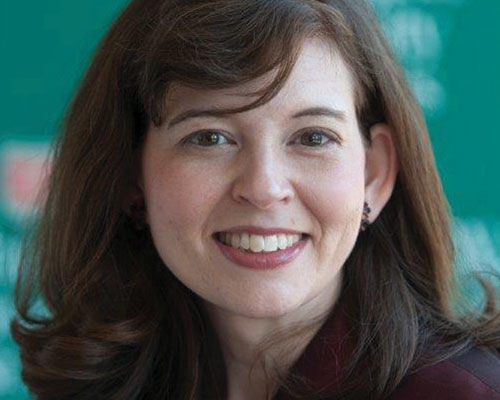From 2000 to 2007, Rudisill served as director of the Division of Technical Assistance at the CCB. As TA Director, she initiated new projects in the areas of infant and toddler care, the social and emotional development of young children, and school readiness. In addition, she built bridges between these early childhood programs and programs at the U.S. Department of Education. Prior to that, she was Special Assistant to ACF Assistant Secretary Olivia Golden and worked extensively on the Clinton Administration's childcare initiative.
During her tenure as OCC director, Rudisill has promoted childcare policies and practices that are child-focused, family-friendly, and fair to providers. Her accomplishments include putting forward a reform agenda for reauthorization, overhauling the state, territory, and tribal childcare planning process, and restructuring the OCC TA network. This work has resulted in a Child Care Development Fund (CCDF) program concentrated on improving health and safety in childcare programs, strong professional development and workforce initiatives, quality rating and improvement systems (QRIS) that set standards of excellence for child care providers, and a subsidy system that balances the importance of program integrity with child care access for vulnerable families. Rudisill also works closely with the Department of Education to build a high-quality, integrated early learning system through the Race to the Top-Early Learning Challenge.
Rudisill is a graduate of Duke University and has a Master of Social Work degree from the George Warren Brown School of Social Work at Washington University in St. Louis.
What are the accomplishments you are most proud of?
I'm tremendously proud of my work with the Office of Child Care. At OCC, we work with states, tribes, and territories across the country to ensure that low-income children from birth through twelve years old have access to child care through the Child Care and Development Fund. Each month, we serve approximately 660,000 school-age children in afterschool programs. Parents who receive a subsidy through CCDF can choose from a wide range of programs, including school-based programs, community-based programs, and family childcare homes. We want all parents to have high-quality options for out-of-school time, and I'm proud to say that OCC is working hard to make that happen. In my time as director, we've worked to raise the bar on quality. Through CCDF, states invest $1 billion every year in quality improvements like teacher training and grants to programs for curriculum and materials.
Where do you see the field in ten years?
Programs for school-age children have the chance to go beyond the classroom in exploring each child's interests and talents. In afterschool and summer programs, teachers and other professionals can focus on the development of the whole child—academic, social, and emotional. Across the education spectrum, we are seeing greater acknowledgement that developing the skills that matter in the twenty-first century requires a focus on more than just academic content. Afterschool and summer care offer a broad range of opportunities for self-motivated learning, experimental learning, teamwork skills, and leadership development. I believe that in ten years, there will be more recognition for the importance of the work afterschool programs to help children succeed in school and in life.
What are the biggest opportunities for the afterschool industry?
The biggest opportunity for the afterschool community is to embrace its natural strength—the freedom to design programs that intentionally build on what happens during the school day with a much wider variety of experiences: the arts, physical activity, community service, and activities that develop critical and strategic thinking—like chess. In afterschool programs, we have a chance to engage children who may be struggling in the classroom or may have great potential to excel in a new area that they never had a chance to explore. This flexibility means we are limited only by our imaginations. For example, my children have benefited from a stellar, creative summer day camp. The staff at the camp were the first ones to get my reluctant writer to put pen to paper, writing in his "passport" about places that he "visited" in his Global Adventures camp—which also featured a tricycle Tour de France, learning greetings in various languages, and making paper lanterns.
What are the biggest challenges facing afterschool?
One of the key challenges is working to make sure that careers in school-age care are attractive, rewarding, and well-compensated. Educators are the most essential ingredient in good afterschool programs. We have many exceptional professionals in the field, but we have to acknowledge that it is a struggle to structure good part-time, full-time, and variable-schedule jobs and create a career pathway so that we can recruit and retain a highly qualified workforce. Even tougher is achieving adequate, sustainable financing for afterschool programs, so that these skilled and passionate teachers receive the recognition, support, and compensation they deserve.
What makes an after school program successful?
The teachers and leaders are at the heart of any program's success. This is especially true in afterschool and summer programs, because of the mixed age groups and wide variety of interests and abilities in every group of children. Watching my own children transition to from preschool to afterschool care, I was struck by the different skills required to manage a group of kindergarten through sixth-graders, all of whom are eager to be in charge of their own choices after a long day of school. In my children's program, teachers are constantly balancing their curriculum goals with the interests and abilities of the children in the group—adjusting and modifying as needed. Programs that can harness the intrinsic motivation and natural curiosity of children and connect those to an intentional curriculum are preparing the next generation of leaders. They also happen to be offering a priceless service for working parents like me!
Edited by Amy L Charles, editorial director of AfterSchool Today magazine, the Official Publication of the National AfterSchool Association.

